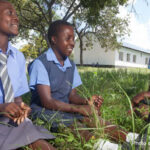We are now looking for the Conference Committee.
The UKFIET Conference 2023 will be organised around a number of themes, representing different aspects of the overall conference theme ‘Education for Social and Environmental Justice: Diversity, Sustainability, Responsibility’. Each of these themes will be led by 2 co-convenors drawn from different organisations to facilitate critical dialogue across constituencies – research, policy, practice, etc.
The theme co-convenors will play a critical role in shaping both their sub-theme and its place within the conference, and the overall format of the Conference through membership of the 2023 Conference Committee. The Conference Committee comprises a conference chair and two deputy-chairs, conference manager, BAICE representative and the theme co-convenors. The UKFIET engagement fellow is also a member of the committee.
The list below outlines the key tasks for theme convenors; it is hoped convenors will undertake tasks collaboratively with their co-convenor including sharing attendance at the Conference Committee meetings to limit the demands on colleagues’ time.
- To contribute to the overall conference strategy and format as a member of the Conference Committee and to attend all conference committee meetings. (We anticipate meetings in December (shaping the themes), April (agreeing acceptances), July (programming) and meetings either side of the conference itself in September 2023; the meetings will be a mixture of virtual meetings and face to face meetings in London where necessary and feasible.)
- To develop their conference theme. To compose a narrative for their sub-theme inviting abstracts for individual papers and symposia as agreed with the Conference Committee.
- To review submitted abstracts for their sub-theme and put forward a selection for inclusion in the conference in line with the policy agreed by the Conference Committee (approximately 50 to 100 abstracts).
- To organise sessions for their sub-theme in consultation with other members of the Conference Committee to ensure a coherent programme; identifying and contacting sessions chairs and contributors.
- To support planning for a successful hybrid approach to the conference.
- To oversee the smooth running of sessions within their sub-theme at the conference.
- To contribute a short blog piece for the UKFIET website, one from each co-convenor; one on the key ideas emerging in their theme, the other retrospective on the theme following the conference. This could be written or an audio/video file for example a conversation between the 2 co-convenors.
Convenor contributions to the UKFIET Conference 2023 will be recognised with a fee waiver for the conference and three nights of accommodation in Oxford for the conference (12-14 September 2023). All reasonable expenses for meetings etc, including travel within the UK, will be reimbursed.
Ideally but not exclusively, Convenors should be associated with UKFIET member organisations and no more than 1 convenor will be from any one organisation to ensure that a broad range of organisations have the opportunity to input to the conference.
We invite expressions of interest in this role; please send a summary CV and short note outlining your area of expertise and to which theme(s) it aligns to Yulia Nesterova (2023 Conference Chair) and Sarah Jeffery (UKFIET Conference manager) by 14 November 2022. yulia.nesterova@glasgow.ac.uk; s.jeffery@ukfiet.org
Theme:
Education for Social and Environmental Justice: Diversity, Sustainability, Responsibility.
Crises including the COVID-19 pandemic, the unfolding climate emergency and ongoing and resurgent violent conflict have shown that progress towards a sustainable planet is fragile and reversible. Ensuing and ever-increasing inequality and injustice threaten progress towards the goal of equitable quality education and lifelong learning (including social, emotional, physical, cognitive, and creative aspects) for all by 2030 (SDG4) and require urgent remediation and mitigation. Education and learning among marginalised groups in particular must be prioritised as a shared global responsibility if the tide of widening inequalities and injustices is to be stemmed and in furtherance of global human rights. Moreover, equitable and sustainable progress require much more than ’business as usual’, calling not only for innovation but for transformation. Re-thinking conceptualisations of education and learning and spaces where they take place (diverse learning spaces such as home, community, religious spaces, among many others) is critical. Re-imagining relations between global North and South in education and learning is fundamental to addressing marginalisation and its root causes, including by ‘reversing the gaze’ to critically examine the role played by the North in education, learning, and development from the perspectives of the global majority. This conference will bring together scholars and practitioners in the field of international education, training, and lifelong learning at this crucial half-way point on the timeline set for the SDGs in 2015, offering opportunity for diverse and critical dialogue and debate on ways forward in this crucial field of research and practice.
There will be six Sub-themes:
- Conflict, crisis, climate and migration
The focus of this sub-theme: e.g., How various crises, threats, and stresses affect justice and equality in formal, non-formal, and informal education (including TVET and lifelong learning). How global trends of migration due to poverty, violent conflict, natural disasters, and climate crisis are widening the inequality gap. How education, training, and learning can help us resolve injustices that lead to violent conflict or that emerge from climate emergency and migration.
- Decolonisation, politics, knowledges and power
The focus of this sub-theme: e.g., Who holds the power to frame education and learning and who is excluded from these processes and whose values, knowledge systems, voice, and aspirations shape education and learning. How can indigenous, southern, decolonial methodologies, values, and/or theories help us decolonise education and learning and change the unequal balance of power and move from a status quo that concentrates power within patriarchal and racial hierarchies. Who holds the power in partnerships between/among diverse actors and stakeholders and how to build and sustain effective and just collaborations. In the wake of racial inequalities new questions are emerging, what does a critically reflective and radical education mean to dismantle power asymmetries in educational research and practice? How do we address the newly emerging challenges with a sense of racial and epistemic justice? The theme covers pedagogic, social and cultural practices that challenge knowledge hierarchies and/contribute to a better understanding of power hegemonies through and within educational research and practices.
- Planning, finance, technology and data
The focus of this sub-theme: e.g., How to ensure that global and national financing of education, training and lifelong learning supports us in achieving social and environmental justice – how to move from an obsession with growth and scale to a focus on sustainability, understanding of context, and deep impact. How we can move to a discourse that asks how investments can be more material for gender, racial, and broader equality. How can educational data lead to social and environmental justice and what kinds of data do we need for this; how can technology be harnessed to improve the quality and equity of education. How does technology enable and restrict work towards social and environmental justice.
- Rights, equity and inclusion
The focus of this sub-theme: e.g., What does inclusion in a just education system look like. Who is education meant to serve? How can marginalised and vulnerable groups participate and lead in debates and planning of education and learning. With the complexities in global-national-local relationships what does equity and inclusion mean on a global, national and local scale? How can the rules of the game be transformed? How can we move from competition and individualism to cooperation, collectivism and collaboration?
- Education systems including workforce and curricula
The focus of this sub-theme: e.g., How to ensure deep and ongoing workforce engagement with families and communities, especially the most disadvantaged and vulnerable groups. How to prepare teachers and school leaders to establish and sustain just environments in educational institutions (including pre-primary, primary, and secondary schools, TVET institutions, universities, etc.) and to work towards justice in their contexts. How to ensure that social and environmental justice is holistically incorporated across written, taught, and assessed curriculum.
- Holistic learning processes and outcomes
The focus of this sub-theme: e.g., What pedagogies can facilitate learning that leads to achieving social and environmental justice. Children learn in different spaces – in the home, in the community, in the learning centre, in the school – how can we ensure that these align with the principles of justice and bring to the fore marginalised pedagogies and learning. Education for what – how can we ensure that the learning experience nurtures the whole person – and values diverse, holistic learning and development outcomes to support social and environmental justice?





